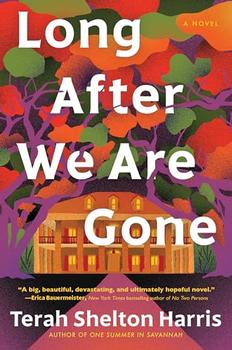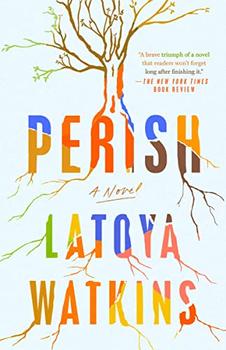Summary | Excerpt | Reading Guide | Discuss | Reviews | Beyond the book | Read-Alikes | Genres & Themes | Author Bio

A Novel
by Terah Shelton HarrisTerah Shelton Harris's marvelous family drama Long After We Are Gone begins with the death of the Solomon family patriarch, King, whose last words are "don't let the white man take the house." As his four adult children return to the farm that their ancestors have occupied for generations, they discover how difficult it will be to fulfill King's wish. The 200-acre parcel has been passed down over the years as heir property — a system whereby all legal heirs receive an equal interest in the land (see Beyond the Book). Because King had no will, developers are challenging the family's ownership of the valuable waterfront property.
Complicating matters is the fact that each of the four siblings feels differently about the homestead. Mance, for example, maintains a deep connection to it ("He loves this land because his father does. It provides a sense of belonging…He isn't from this land; he is of this land"). His sister, CeCe, on the other hand, has no desire to retain the property ("The humid air stinks of minimum wage and food stamps, of fried food and bad decisions"). For the eldest, Junior, being home brings painful memories, while Tokey, the youngest, hopes being in their childhood house together will create a sense of family she's never known.
Although the property dispute provides the bones of the story, at its heart are its four main characters. Each is beautifully drawn and unique, coming into the novel harboring painful secrets that they're unwilling to share with the people who should love them unconditionally. Separated by age and temperament, they all feel isolated from the others in their own ways. As the book begins they've individually hit crises unrelated to King's death, aching to reach a point where their lives are stable — and the pain of each situation is palpable. In one instance, Mance is contemplating his infant son, who's been born deaf:
"It astounds Mance that this tiny person already means more to him than anyone else does. That one day he existed when the day before he did not. How instantly parental love materializes. A fierce desire to protect him flooded Mance when he first held him in his arms…Yet he struggles to accept him as he is. He struggles to make sense of such feelings. The two emotions grate against each other and torment him, fracturing his breath and massaging his heart."
The siblings are all deeply flawed but so relatable that they feel like friends rather than characters in a book. One can't help but root for them to overcome their challenges and for the estranged family to heal. The story rotates its point of view between the four, so readers get to know them all intimately, strengthening the connection to them even more.
Beyond the injustices of racism and heir property, Harris explores other issues that might arise in any family (violence, homophobia, disability, eating disorders). Perhaps most crucially, she illustrates how trauma is passed down through families, generation after generation, and considers how one might break the destructive cycle. I appreciated the way the author dealt with these sensitive subjects, subtly examining them without allowing her message to become overbearing.
The book is fast-paced, and I found it hard to put down. There are a few over-the-top scenes that, critically speaking, one might consider unworthy of such an otherwise outstanding work; they explode with improbable action more fitting of popular cinema than fine literature. I have to admit, though, I found them exceptionally satisfying; while implausible, they still feel right for the moment, and will leave many readers cheering.
Overall, I felt Long After We Are Gone to be a sensitive exploration of heir property and family dynamics, and I heartily recommend it to a broad audience. The novel's many themes and relatable characters make it a great choice for book clubs.
![]() This review
first ran in the June 5, 2024
issue of BookBrowse Recommends.
This review
first ran in the June 5, 2024
issue of BookBrowse Recommends.

If you liked Long After We Are Gone, try these:

by LaToya Watkins
Published 2023
From a stunning new voice, comes a powerful debut novel, Perish, about a Black Texan family, exploring the effects of inherited trauma and intergenerational violence as the family comes together to say goodbye to their matriarch on her deathbed.

by Shelley Read
Published 2023
Set amid Colorado's wild beauty, a heartbreaking coming-of-age story of a resilient young woman whose life is changed forever by one chance encounter. A tragic and uplifting novel of love and loss, family and survival—and hope.
Your guide toexceptional books
BookBrowse seeks out and recommends the best in contemporary fiction and nonfiction—books that not only engage and entertain but also deepen our understanding of ourselves and the world around us.